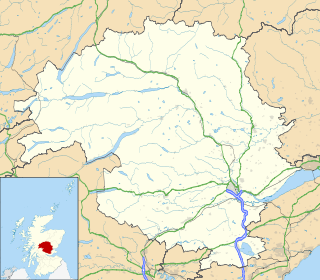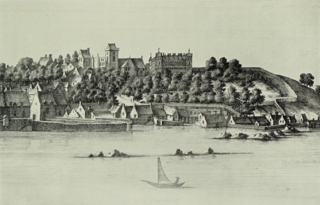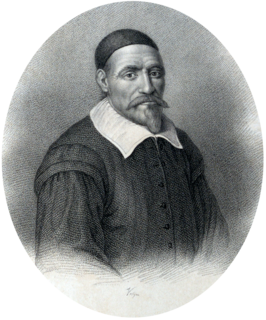
Robert Pont (1529–1606) was a Scottish minister, judge and reformer. He was a church minister and commissioner and a Senator of the College of Justice. Pont was born at Culross, and educated at St. Andrews and on the Continent in Reformation principles. His translation of the Helvetian Confession was ordered to be printed by the General Assembly. Pont's legal skill allowed him to be made Provost of Trinity College, and through the influence of Morton, but with the consent of the Assembly, he accepted a seat in the Court of Session in 1572. Working for the church he assisted in the preparation of the Second Book of Discipline. He protested so prominently against the Black Acts that he was compelled for a time to take refuge in England. On returning with Angus and other Protestant Lords, he resumed his ministerial duty at St. Cuthbert's. Among other writings, he prepared for the Assembly three sermons against sacrilege and also published also a revised edition of the Psalms, and a Latin treatise on the "Union of the two Kingdoms," in 1604. He died in 1606.
Rev Dr Gilbert Rule was a nonconformist Church of Scotland minister and the Principal of Edinburgh University from 1690 to 1701.
John Douglas was Archbishop of St. Andrews from 1572 to 1574. As was tradition from the fifteenth to the seventeenth centuries, the Archbishop would take on the role of Chancellor of the University of St Andrews, as the University had strong links with the Pre-Reformation church.
John Durie (1537–1600) was one of the first Presbyterian ministers in Edinburgh after the Reformation in Scotland.

Rhynd is a hamlet in Perth and Kinross, Scotland. It is located 3+1⁄4 miles southeast of Perth, on the south side of the River Tay.

The Scots International Church or the Scottish Church is located in Rotterdam, The Netherlands. An English-language Protestant church in the Presbyterian tradition, it is part of the Church of Scotland, within the Church's Presbytery of Europe.
Walter Balcanquhall (1548–1617), was one of the first Presbyterian ministers in Edinburgh after the Reformation in Scotland.
Robert Durie (1555–1616) was a Scottish presbyterian minister. He achieved notoriety for his presbyterian principles which brought him into conflict with James VI who wished to impose an episcopalian system. He attended the General Assembly of Aberdeen in 1605 which had been prorogued by royal authority and was one of six ministers who were imprisoned and later exiled as a result.
Neil Campbell, M.A. was a Scottish clergyman who served in the Church of Scotland as the Bishop of the Isles from 1633 to 1638.
Very Rev James Montgomery Campbell DD (1859-1937) was a Scottish clergyman who served as Moderator of the General Assembly of the Church of Scotland in 1928.

Rev Thomas Hog of Kiltearn (1628–1692) was a controversial 17th century Scottish minister.

Michael Potter was a covenanter. He graduated from Edinburgh on 27 July 1663. He was licensed to preach the gospel in the year 1673. He was a tutor to the family of George, the Laird of Dunglass of that ilk. He was ordained by presbytery for the adherents in the parish of St. Ninians in 1673. He was elected a schoolmaster to Culross by the magistrates. This led to them being summoned before the Privy Council in 1677.

Alexander Forrester was born in 1611, son of Duncan Forrester and Margaret Ramsay. He was descended from the Forresters of Garden. He graduated with an M.A. from St Andrews University in 1631. He had been "ane conformist in Ireland, preached three quarters of a year in Edinburgh, and been two years with the armie". He was proposed for the parish of Livingston in 1646 but settled in St. Mungo in 1650. Refusing to conform to Episcopacy in 1662, he was confined to the parish. He was apprehended for holding a conventicle. He acted as clerk to a General Meeting of Presbyterian ministers in Edinburgh, 24 May 1676.
Thomas Ross of Nether Pitkerrie, was born about 1614. He was the son of George Ross of Nether Pitkerrie. He continued in Kincardine after the establishment of prelacy and owes his leaving to a meeting with John M'Gilligan.
Archibald Fleming TD Order of St Sava (1863–c.1930) was a Scottish minister, military chaplain and religious author. He was Grand Chaplain to the Grand Lodge of Freemasons in Scotland.
John Sharp was a theologian and Church of Scotland minister. He achieved notoriety for his presbyterian principles which brought him into conflict with James VI who wished to impose an episcopalian system. Sharp graduated with an M.A. from St Andrews in 1592. He was admitted to Kilmany in 1601. He was one of those who, in opposition to the Royal command, attended the General Assembly of Aberdeen. For this he and five other ministers were committed to the Castle of Blackness on 2 August. He was brought before the Privy Council at Perth on 27 August and interrogated as to the constitution of the Assembly. Not giving satisfactory answers they were tried before the Justiciary Court at Linlithgow on 10 January 1606, on a charge of treason, found guilty, and banished for life. On 23 October Sharp went to Bordeaux and became Professor of Theology in the University of Die, but would probably have returned to Scotland had honourable terms of reconciliation been offered him. In 1630 he was compelled to leave France at the instance of Cardinal Richelieu, the Prime Minister, who had grown jealous of Sharp's reputation as a Protestant teacher. Sharp was appointed Professor of Divinity in the University of Edinburgh on 17 November 1630. He died about 1647, aged 75.
Angus McBean, or as he was otherwise known by his family Æneas McBean was a Scottish minister and Covenanter. He was the last Presbyterian minister deposed under Episcopacy.
Robert Cunningham was one of the early Scots ministers who settled in Ulster in the 17th century. He was the first Presbyterian minister in Holywood and was one of Samuel Rutherford's correspondents. He was deposed for his adherence to Presbyterian principles.

James Lawson was the Church of Scotland minister who succeeded John Knox at St Giles' Cathedral in Edinburgh. Lawson's great educational achievement was the founding of the University of Edinburgh. He may be said to have been its principal promoter, and its best and wisest friend during the first year of its history, 1583.

Alexander Petrie was a Scottish divine, born about 1594, was third son of Alexander Petrie, merchant and burgess of Montrose. He was the minister of Rhynd in Perthshire and was translated, to Rotterdam on 29 March 1643. He preached his first sermon at Rotterdam on 2 August, and was admitted on 30 August 1643. He died on 6 September 1662. His Compendious History of the Catholick Church contains copious extracts from the Records of the General Assembly of the Church of Scotland, which were destroyed by a fire in the Lawnmarket, Edinburgh, 1701.









